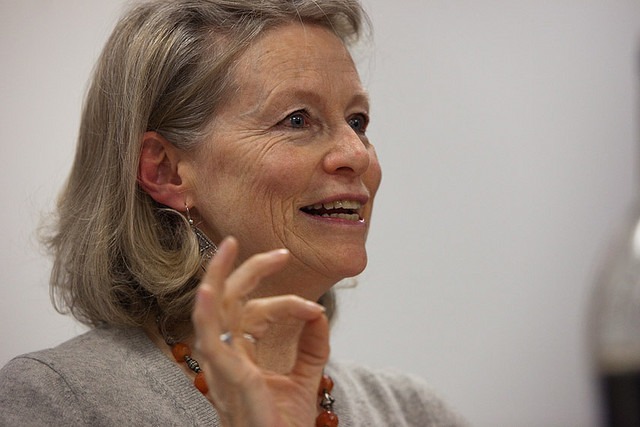The play has won international acclaim and has been in theatres in the West End and America educating the people on the horrendous events of Guantanamo Bay and the reality of control orders in Britain.
The play tells the stories of eight women who are refugees or wives of refugees in the UK using their own words and real life experiences on how there life instantly changed after the horror that struck on 9/11.
Brittain discussed the experience of one women called Sabah, a deeply religious women from Jordan who was originally Palestinian and how she came with her husband to England as a refugee. She described the women’s peaceful life in Jordan as a school teacher and the moment when she met her husband and the serene life that they lived with their children. Victoria Brittain then went on to discuss the aftermath of Sabah’s life following her innocent husbands detention in Guantanamo Bay and the severe impact it had on her family. Brittain explained how Sabah once let her interview her two boys that were around the age of 9 and she asked them if they knew where there father was. The boys explained that they knew that he was in Cuba but they did not know what he had done wrong. Victoria described that she was overwhelmed by this answer but also relived as she could finally tell the boys that their father had not done anything wrong but that he was wrongfully imprisoned without trial.
Victoria then went on to discuss another individual’s story in the book called Nour who was also from Palestine originally and had come to the UK as refugees. She explained how Nour’s husband was put under a control order which meant that her family had certain restrictions on their daily life including restrictions on movement, money and who they were allowed to see. This had a severe detrimental impact on the family as every minute part of their life was under the discretion of the Home Office, even something as simple as food shopping was monitored and only basic essentials were allowed for Nour’s husband, and the shopping list would first have to be sent to the authorities and pending approval you were allowed to buy certain items. The uncertainty that came with the Control Order i.e. the duration of the control order and the restrictions that it enforced started to corrode the relation with one self and family. Brittain explained the absurdity of the control order through Nour’s experiences by describing the situation when the police barged into Nour’s house and took off the bath panelling and took away all the children’s toys for reasons unknown.
Victoria Brittain explained how this dehumanisation process of the control order was specifically designed to try and force people to retreat back to their country of origin, which is significantly hard for them as they would be tortured if they went back. Victoria concluded the evening by reading out an extract from the book on Sabah’s final words: ‘I try to forget. I must forget. I must forgive.’
The Meaning of Waiting is available online at: IHRC Shop and Donations and the video of the event will be online soon on the IHRC YouTube TV channel.







